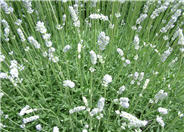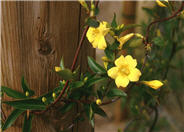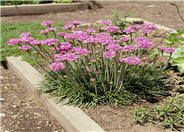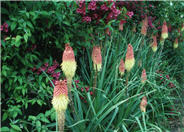
Common name:Munstead Dwarf Lavender
Botanical name:Lavandula angustifolia 'Munstead'
While this hybrid is half the size of the standard angustifolia, it flowers early and has a more intense flower color than most of the species. Its foliage and flowers are good for sachets. This is a perfect choice for smaller scale situations. It is drought tolerant and attracts butterflies and hummingbirds.
-Cornflower Farms

Common name:Carolina Jessamine
Botanical name:Gelsemium sempervirens
As a vigorous evergreen, this vine has fine, rich, glossy foliage complete with trumpet-shaped, yellow flowers that are borne from late winter to spring. Carolina Jessamine will bloom best in full sun.

Common name:Gray Lavender Cotton
Botanical name:Santolina chamaecyparissus
This ground cover/small shrub will grow to 3' tall and has small, grayish silver leaves with yellow flowers that bloom in the summer.

Common name:Chinese Wisteria
Botanical name:Wisteria sinensis
While the sinensis is similar to the floribunda, it bears more rounded, full clusters of strongly fragrant flowers which open more or less all at once. There are usually 13-15 leaflets per leaf, and they require full sun and average to little watering. It comes in many colors such as blues, whites and purples.-Monterey Bay Nursery

Common name:Sea Pink, Common Thrift
Botanical name:Armeria maritima
This clumping, grass-like perennial can be planted in full sun in coastal areas but needs afternoon shade in warm inland areas This CA native has small pink flowers that resemble pom poms that bloom in spring and summer. This cute flower can be used between pavers as it can tolerate light foot traffic. Overall height of plant is about 1' tall. It is drought tolerant near coastal areas but requires more water in hot summer areas.

Common name:Torch Lily
Botanical name:Kniphofia species
This perennial will grow to about 6' tall and has large green leaves and has red, orange, and yellow flowers that bloom in spring, summer, and fall.
Designer: Suzanne Biaggi
Photographer: Suzanne Biaggi
Practice grass-cycling by leaving short grass clippings on lawns after mowing, so that nutrients and organic matter are returned to the soil.
Attract, or buy beneficial insects such as ladybugs and lacewings to control pest outbreaks in your garden.